On the Marshals of the Black Templars and Their Potency
By Brother Tyler
This article first appeared as a reply in a discussion about the ranks of the Black Templars Chapter officers and how they compared with the officers in other Adeptus Astartes chapters, debunking the oft-asserted myth that Black Templars marshals are greater than Codex captains and/or equivalent to Codex chapter masters. This article has been corrected, expanded, and updated.
Many Black Templars players assume that just because a crusade might include several hundred members, the rank of the commanding officer scales up over that of a Codex captain, to the point where players sometimes assert that a Black Templars marshal is equivalent to the chapter master in other chapters. Crusades are commanded by marshals regardless of their size, whether only 50 Black Templars in number or up to several hundred (again, allowing for the exception of the High Marshal leading a crusade). In many Black Templars crusades, there are subordinate elements called fighting companies, and these are led by a castellan and may vary in size, up to and including a fighting company that rivals or exceeds a company in a Codex chapter (in a large crusade).
A Black Templars crusade is generally led by a marshal (though the High Marshal also leads crusades) and may be anywhere from as few as 50 to several hundred members (sometimes over a thousand). Very large crusades can look like under-strength Codex chapters, and the largest known crusade was the Armageddon Crusade led by High Marshal Helbrecht, aggregating three previously existing crusades into a single crusade. We know that there have been other crusades exceeding one thousand Black Templars because the lore tells us so, but we don’t know how many there have been in the chapter’s history. Regardless, while crusades can be very large, the number of crusades exceeding a Codex chapter in size can probably be considered exceptional, and these are most likely led by the High Marshal (though it’s quite possible that some have been led by marshals).
The mistake Black Templars players typically make is in comparing a Black Templars Crusade with a Codex chapter’s company. In a Codex chapter, a company is led by a captain and consists of ten squads of ten battle brothers, along with some HQ elements. This is comparable to many crusades as well as some larger fighting companies in terms of absolute numbers, if not in organization. The more accurate comparison for a Black Templars crusade, however, is with a Codex chapter’s detachment.
Often, Codex chapters deploy detachments that consist of multiple companies, rivalling the largest known crusades of the Black Templars (except the thousand+ crusades, for obvious reasons). These detachments, too, will be commanded by a captain (as well as the Chapter Master, on occasion). “Detachment” is just one of the names that might be appended to this type of deployment, with many others also being used, including names such as “strike force,” “crusade,” “task force,” and others.
The Badab War provides several great examples. The information below comes from Imperial Armour Volume Nine – The Badab War – Part One and Imperial Armour Volume Ten – The Badab War – Part Two. Information on the chapters that participated in their entirety – the traitorous Astral Claws, Lamenters, and Mantis Warriors, as well as a few of the loyalists (Fire Hawks, Minotaurs, and Star Phantoms).
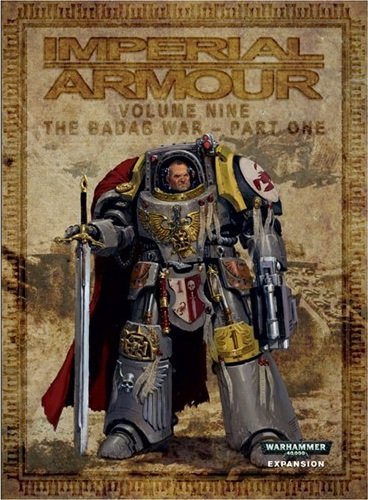
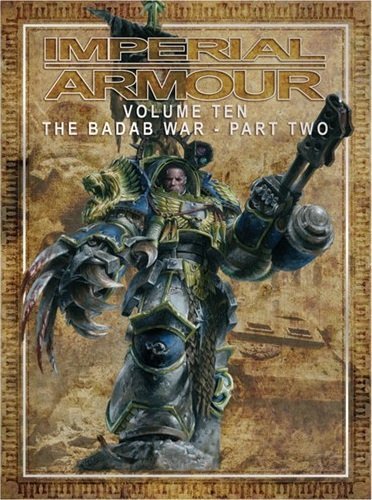
Carcharodons (led by Captain*)
“In size [the Carcharodons] forces were of a rough approximation of six Space Marine Companies, led by their baleful ‘First Captain’ Tyberos… It has not been ascertained whether this force comprised the whole or a part of the Carcharodons’ full Chapter strength, and it may indeed be the case that the Carcharodons themselves did not know the fate of any other sub-fleets of their Chapter still roaming the void.”
* The title of ‘First Captain’ is often given to the Captain of the First Company in a Codex chapter, but it might also mean a chapter master, especially in cases where the two roles are performed by the same person (e.g., the chapter master of the Crimson Fists Chapter also serves as the Captain of the First Company, called the ‘Crusade Company’ while the chapter master of the Salamanders Chapter leads that chapter’s First Company, the ‘Firedrakes’).
Executioners (led by High Chaplain)
“The Executioners Chapter deployed to the Badab War in two distinct stages, the first of which was as a strike force comprising a reinforced 3rd Company commanded by Captain Vanir Hex… The second wave would comprise the balance of the Chapter’s forces except their 2nd Company … and roughly half of their 10th Company…. The total force consisted of roughly seven companies in active strength… This Executioners force, under the direct command of the High Chaplain Thulsa Kane, was fully engaged in the Badab War in early 907.M41.”
It should be noted here that the chapter master of the Executioners committed suicide instead of joining the rest of his Chapter, knowing that they sided with the Astral Claws as a matter of debt to that chapter and that they were on the wrong side of the Imperium. Had he not committed suicide, he would have led the chapter during the Badab War.
Exorcists (led by Captain)
“The Exorcists force comprised the entirety of their 2nd, 3rd, and 5th battle companies, along with their 6th tactical reserve company, 11th scout company and half of their 1st Veteran company. The force … was commanded by Silas Alberec, the famed Exorcists 3rd Company captain and heir-designate to the command of the Chapter.”
Fire Angels (leader unknown)
“The Fire Angels answered the Inquisition’s call for aid in prosecuting the Badab War early in 906.M41, arriving with an effective force equalling [sic] seven companies…”
Howling Griffons (leader unknown)
“The Howling Griffons task force was relatively small in number, consisting of no more than two hundred and fifty Space Marines drawn from the remnants of their 4th Battle Company and elements of their 6th and 10th Companies, reinforced by several Terminator squads…”
Marines Errant (led by Chapter Master)
“The Marines Errant responded to this call by diverting a strong force comprising at least six full companies in strength…”
Novamarines (led by Captain)
“The Novamarines taskforce deployed to the Maelstrom Zone in three strike cruisers with a fleet of twelve supporting attack craft and tenders, comprising their full strength 3rd and 5th battle companies with attached Scouts, and reinforced by elements of their Terminator-equipped 1st Company veterans and several awakened dreadnoughts. The Novamarines taskforce commander for the duration of their involvement in the Badab War was Mordaci Blaylock, the respected captain of their 1st Company Veterans…”
Raptors (led by Chapter Master)
“The Raptors deployed an equivalent combined force strength of four companies to the war zone…”
Red Scorpions (led by Chapter Master**)
“The first major Red Scorpions deployment, a force comprising their 1st, 2nd, 5th, 6th, and 9th companies…”
** After the death of the Lord High Commander (chapter master) of the Red Scorpions Chapter during the events of the Badab War, he was succeeded by Carab Culln and the size of the Red Scorpions detachment was increased from five to eight full companies in strength.
Salamanders (led by Captain)
…a force was hastily assembled under the Captain of the then under-strength 2nd Company, Pellas Mir’san… The bulk of the force was made up of the Salamanders 2nd Company… This was further augmented by reserve elements of the Nocturne garrison, as well as several veteran training instructors along with a core of Firedrakes thirty-strong… The force was further strengthened by a Hextad of Ancients; six venerable dreadnoughts of the Chapter…”
Sons of Medusa (led by Captain – the Iron Thane of a War Clan***)
“The Combined Sons of Medusa force comprised the full strength of the Atropos War Clan backed by forces drawn from the Chapter armouries and elements of the Lachesis and Magaera War Clans with a combined estimated strength of somewhere between five and six Codex companies…”
*** The Sons of Medusa don’t follow the Codex Astartes, instead being organized into three war clans, each consisting of over 300 Space Marines and being further broken down into multiple companies; so a Sons of Medusa war clan is comparable to a large Black Templars crusade and their officers are probably comparable.
Other Imperial Armour books provide similar evidence:
Imperial Armour Volume Three – The Taros Campaign
The Raptors strike force consisted of 2 companies under the command of Captain Orelius.
Imperial Armour Volume Five – The Siege of Vraks – Part One
The Dark Angels ‘Vraks Devastation Force’ was commanded by Supreme Grand Master Azrael (chapter master) and consisted of elements of the 1st, 2nd, 3rd, 5th, 6th, 8th, and 9th companies as well as other elements from the Librarium, Apothecarion, Armoury, and Fleet. The end-strength was about 4 companies in size.
Imperial Armour Volume Seven – The Siege of Vraks – Part Three
The Angels of Absolution force that participated isn’t defined, but it was embarked aboard a battle barge, a strike cruiser, and two escorts, so it wouldn’t have been much more than 4 companies in size. The force was known to have included elements of the 1st and 3rd companies and was led by a company master (captain).
Imperial Armour Volume Eight – Raid on Kastorel-Novem
Shadow Force Korvydae of the Raven Guard consisted of elements of the 1st, 5th, 8th, and 10th Companies as well as other elements from the Armoury, Apothecarion, Librarius, and Fleet. The end-strength was about 2 companies in size and it was led by a shadow captain (captain).
If you examine the sizes of the various detachments sent by different chapters, you see that they often range in size from a reinforced company up to several hundred Space Marines, and those detachments are often led by captains. Chapter masters often accompany larger detachments, but have been known to lead smaller detachments; and the involvement of a chapter master often indicates more that the operation is of extremely high priority (rather than the size of the detachment being the deciding factor). Often, larger detachments include multiple captains, with one being in command and the other(s) being subordinate. In this, there is a distinction between the absolute rank and the operational rank. Both hold the absolute rank of ‘Captain’ but one is operationally in command, holding seniority over the other(s) for the duration of the operation.
In this we see an organization that is comparable with the crusades of the Black Templars.
The span of control that a captain/marshal has might vary. Within a Codex chapter, each captain leads a 100-strong company, but also has special duties and expanded control based on the “master” duties they perform (e.g., Master of the Watch, Master of the Fleet, Master of the Arsenal, etc.). In addition, a Codex chapter captain can lead a detachment that ranges in size from something comparable to a standard company up to multiple companies in size (the largest for which we have an explicit example is about six companies). In the Black Templars, meanwhile, a marshal leads a crusade. A crusade might be anywhere from half of a Codex company in size up to multiple companies in size (the largest for which we have an explicit example is over 8 companies in size).
The evidence (the map in the 4th edition Codex: Black Templars) makes it clear that a Black Templars marshal is often given a much larger span of control than a Codex captain in that the crusades of the Black Templars, though sometimes smaller than a Codex company, are often significantly larger and often compare with large detachments. In terms of absolute rank, though, a captain from a Codex chapter stands on equal footing with a Black Templars marshal except when one temporarily has seniority over the other; and while Black Templars fans might want to think that the Black Templars marshal will be the one that holds that seniority, especially if he is in command of a crusade larger than the detachment commanded by the captain, it’s just as likely that the Codex captain might hold seniority over the marshal. More importantly, in terms of the rules potency, the two are clearly equivalent (except for those exceptional individuals that might use a “higher” or “lower” stat line/rules entry).
More importantly, we really need to distinguish between the absolute rank and the rules rank. In terms of rules, the officers of the Black Templars are analogous to their Codex chapter counterparts:
- High Marshal ≈ Chapter Master
- Marshal ≈ Captain
-
Castellan ≈ Lieutenant
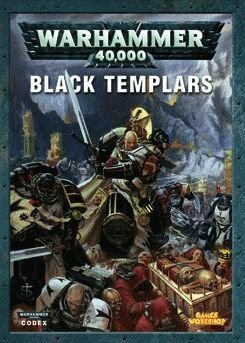
To be fair, Codex: Black Templars from the 4th edition of the Warhammer 40,000 game did present Black Templars marshals as equivalent to the masters of other chapters in their rules, and the Black Templars castellans were equivalent to the captains of other chapters. Black Templars players whose roots go back to the 4th edition (or earlier) can’t really be blamed for the misunderstanding, but all subsequent rules updates make it clear that the marshals of the Black Templars are comparable with the captains of other chapters (in much the same way the Black Templars are no longer a Codex chapter, despite being presented as such in the 2nd edition Codex: Ultramarines). The misalignment has been walked back in more recent editions, however, with the High Marshal being in line with other chapter masters, marshals being in line with other captains, and castellans being in line with other lieutenants. The codex supplement for the Black Templars published in the 9th edition of the game solidified this equivalency.
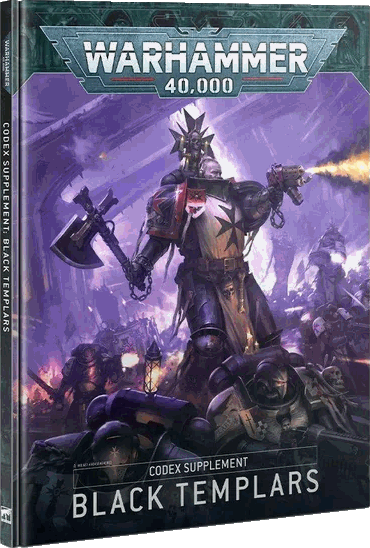
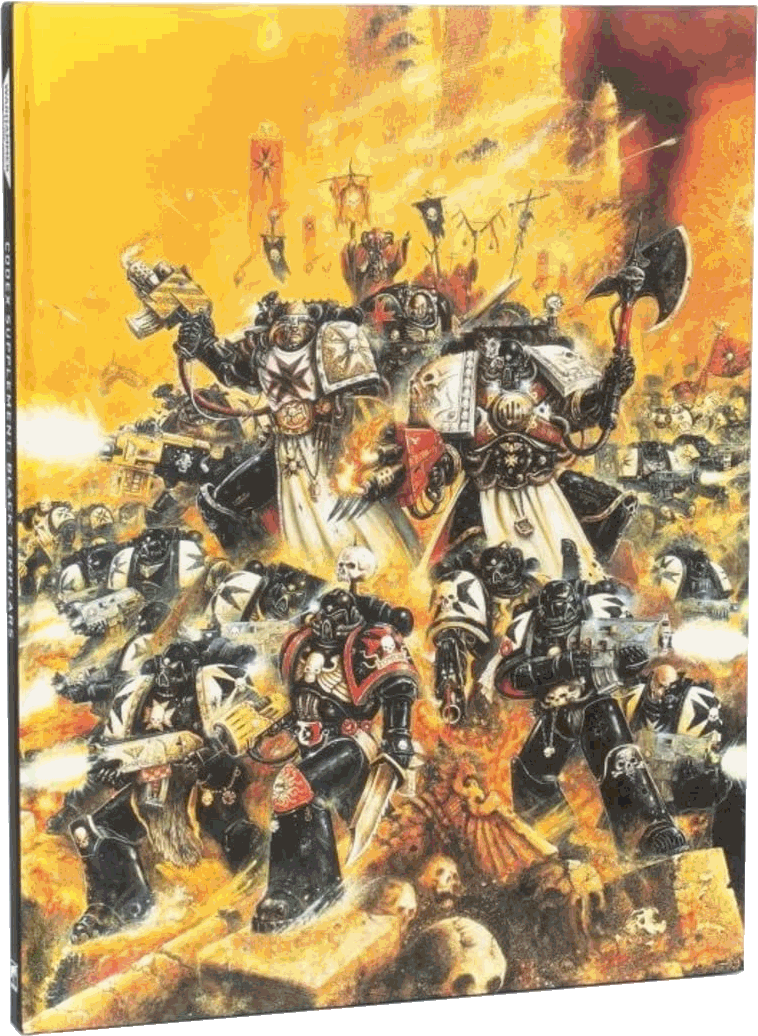
However, Black Templars players are free to use the units any way they want, especially in cases where they are not using a codex or codex supplement dedicated to the Black Templars when representing a Black Templars army. They might choose to have a chapter master represent an especially potent marshal, or a captain might represent an especially potent castellan. After all, not everyone is equal and it’s entirely conceivable that some Black Templars marshals might be on par with the masters of some other chapters, or that some castellans might compare favorably with the captains of other chapters. Keep in mind, however, that the reverse might also be true – that some captains of other chapters might stand shoulder to shoulder with the High Marshal of the Black Templars, and some lieutenants might be equal to some Black Templars marshals.
![]()
 Brother Tyler has been a member of the Bolter & Chainsword since 1999 and has been involved in the Warhammer 40,000 hobby since 1987. He has been a zealous fan of the Black Templars Chapter since Codex: Armageddon was published during the 3rd edition of the game. This article represents his own views.
Brother Tyler has been a member of the Bolter & Chainsword since 1999 and has been involved in the Warhammer 40,000 hobby since 1987. He has been a zealous fan of the Black Templars Chapter since Codex: Armageddon was published during the 3rd edition of the game. This article represents his own views.
A .pdf version of this article can be downloaded here.
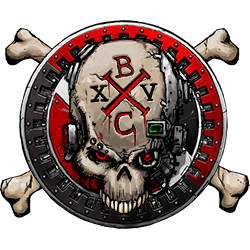


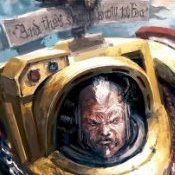
Recommended Comments
There are no comments to display.
Create an account or sign in to comment
You need to be a member in order to leave a comment
Create an account
Sign up for a new account in our community. It's easy!
Register a new accountSign in
Already have an account? Sign in here.
Sign In Now